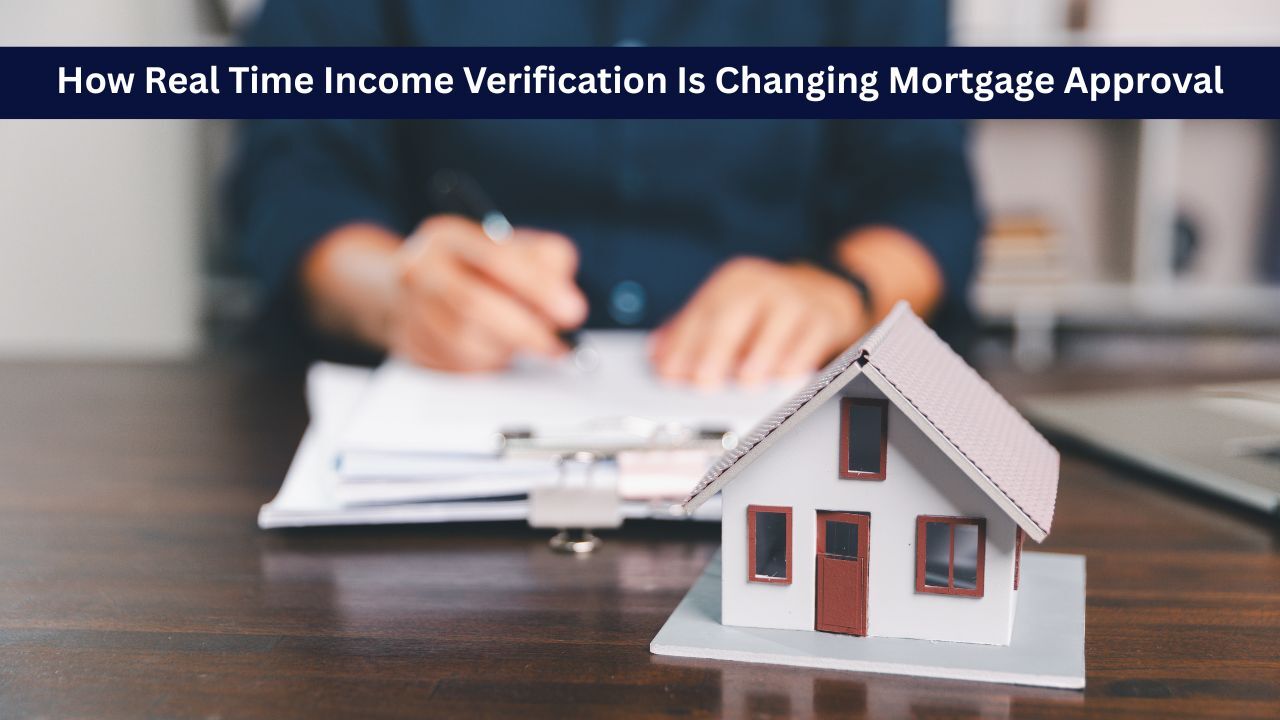How Real-Time Income Verification Is Changing Mortgage Approval
 Mortgage approval used to require weeks of gathering documents, submitting pay stubs, waiting for HR departments to respond, and hoping everything lined up perfectly. Today, more lenders are moving toward real-time income verification, a faster and more accurate way to confirm your income during the mortgage process. This shift is making the approval timeline smoother for buyers and giving lenders a clearer picture of your financial situation.
Mortgage approval used to require weeks of gathering documents, submitting pay stubs, waiting for HR departments to respond, and hoping everything lined up perfectly. Today, more lenders are moving toward real-time income verification, a faster and more accurate way to confirm your income during the mortgage process. This shift is making the approval timeline smoother for buyers and giving lenders a clearer picture of your financial situation.
Understand What Real-Time Income Verification Means
Real-time income verification allows lenders to confirm your employment and income instantly through secure digital systems. Instead of relying on paper documents, lenders use approved payroll databases to see your income history, year-to-date earnings, and job status. This reduces paperwork, eliminates delays, and gives lenders a more accurate snapshot of your financial stability.
See How It Speeds Up the Approval Process
Traditional income verification can slow down a mortgage application, especially when employers take several days to respond. Real-time verification shortens this step significantly. With instant access to your income information, lenders can move your application forward faster. This can make a big difference in competitive markets where quick approvals help you stand out as a strong buyer.
Learn Why Accuracy Matters for Your Loan
Manual documents can lead to errors such as outdated pay stubs, missing information, or inconsistent figures. Real-time verification reduces those risks because the information comes directly from payroll systems. This accuracy helps prevent surprises, and it can reduce back-and-forth communication between you and your lender. With fewer mistakes, your approval process becomes smoother and less stressful.
Understand the Benefits for Self-Employed and Gig Workers
Not all real-time verification systems work for self-employed buyers, gig workers, or freelancers, but the industry is moving in that direction. More platforms are beginning to include income tracking for non-traditional workers, which may make future approvals easier for people who do not receive standard paychecks. As technology expands, variable-income buyers will benefit from faster and more transparent verification options.
Know How It Protects Your Loan from Delays
Because income verification is one of the most important steps in underwriting, issues with paperwork can delay closing. Real-time systems remove many of these obstacles. This helps keep your file moving, even during busy seasons, and decreases the chance of last-minute problems. Faster verification also means lenders can focus more on your full financial picture, not just paperwork.
Real-time income verification is transforming the way mortgages are approved. By making the process faster, more accurate, and more secure, it gives homebuyers a smoother experience and more confidence when moving through the loan process. As this technology continues to grow, it will make mortgage approval more accessible and less stressful for everyone.

 Medical bills are one of the most common reasons people face unexpected debt, and many borrowers are surprised when they see a medical collection appear on their credit report. Even though medical debt is often caused by emergencies rather than irresponsible spending, it can still impact your mortgage application. Understanding how lenders view medical collections can help you prepare, protect your credit, and move confidently toward homeownership.
Medical bills are one of the most common reasons people face unexpected debt, and many borrowers are surprised when they see a medical collection appear on their credit report. Even though medical debt is often caused by emergencies rather than irresponsible spending, it can still impact your mortgage application. Understanding how lenders view medical collections can help you prepare, protect your credit, and move confidently toward homeownership. Buy Now Pay Later services have become a popular way to spread out small purchases, and for many buyers, these plans feel harmless. The payment amounts are usually small, the approval process is quick, and the apps are easy to use. What many future homebuyers do not realize is that Buy Now Pay Later activity can affect a mortgage application in ways that may not be obvious. Understanding how this type of debt shows up in your financial profile can help you prepare before you apply for a mortgage.
Buy Now Pay Later services have become a popular way to spread out small purchases, and for many buyers, these plans feel harmless. The payment amounts are usually small, the approval process is quick, and the apps are easy to use. What many future homebuyers do not realize is that Buy Now Pay Later activity can affect a mortgage application in ways that may not be obvious. Understanding how this type of debt shows up in your financial profile can help you prepare before you apply for a mortgage.